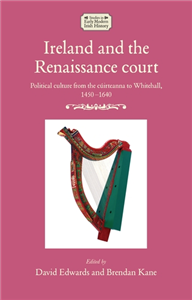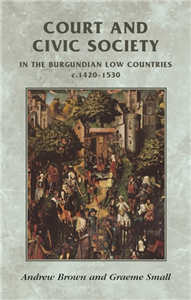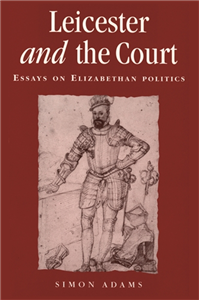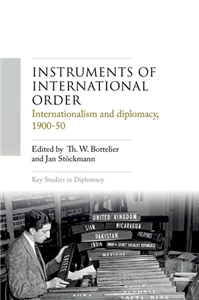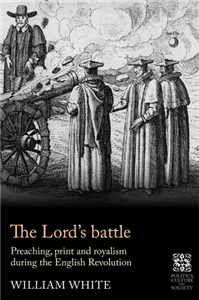Your Search Results
-
Promoted Content
-
Promoted ContentLiterature & Literary StudiesJanuary 2014
Court and civic society in the Burgundian Low Countries c.1420–1530
by Andrew Brown, Graeme Small
This volume is the first ever attempt to unite and translate some of the key texts which informed Johan Huizinga's famous study of the Burgundian court, The Waning of the Middle Ages, a work which has never gone out of print. It combines these texts with sources that Huizinga did not consider, those that illuminate the wider civic world that the Burgundian court inhabited and the dynamic interaction between court and city. Through these sources, and an introduction offering new perspectives on recent historiography, the book tests whether Huizinga's controversial vision of the period still stands. Covering subjects including ceremonial events, such as the spectacles and gargantuan banquets that made the Burgundian dukes the talk of Europe, the workings of the court, and jousting, archery and rhetoric competitions, the book will appeal to students of late medieval and early modern Europe and to those with wider interests in court culture, ritual and ceremony.
-
 Trusted Partner
Humanities & Social SciencesAugust 2024
Trusted Partner
Humanities & Social SciencesAugust 2024Ireland and the Renaissance court
by David Edwards, Brendan Kane
Ireland and the Renaissance court is an interdisciplinary collection of essays exploring Irish and English courts, courtiers and politics in the early modern period, c. 1450-1650. Chapters are contributed by both established and emergent scholars working in the fields of history, literary studies, and philology. They focus on Gaelic cúirteanna, the indigenous centres of aristocratic life throughout the medieval period; on the regnal court of the emergent British empire based in London at Whitehall; and on Irish participation in the wider world of European elite life and letters. Collectively, they expand the chronological limits of 'early modern' Ireland to include the fifteenth century and recreate its multi-lingual character through exploration of its English, Irish and Latin archives. This volume is an innovative effort at moving beyond binary approaches to English-Irish history by demonstrating points of contact as well as contention.
-
 Trusted Partner
Literature & Literary StudiesMarch 2013
Trusted Partner
Literature & Literary StudiesMarch 2013The Intellectual and Cultural World of the Early Modern Inns of Court
by Edited by Jayne Archer, Elizabeth Goldring and Sarah Knight
This is a collection of essays on an important but overlooked aspect of early modern English life: the artistic and intellectual patronage of the Inns of Court and their influence on religion, politics, education, rhetoric, and culture from the late fifteenth through the early eighteenth centuries. This period witnessed the height of the Inns' status as educational institutions: emerging from fairly informal associations in the fourteenth century, the Inns of Court in the fifteenth and sixteenth centuries had developed sophisticated curricula for their students, leading to their description in the early seventeenth century as England's 'third university'. Some of the most influential politicians, writers, and divines - as well as lawyers - of Tudor and Stuart England passed through the Inns: men such as Edward Hall, Richard Hooker, John Webster, John Selden, Edward Coke, William Lambarde, Francis Bacon, and John Donne. This is the first interdisciplinary publication on the early modern Inns of Court, bringing together scholarship in history, art history, literature, and drama. The book is lavishly illustrated and provides a unique collection of visual sources for the architecture, art, and gardens of the early modern Inns ;
-
 Trusted Partner
Social services & welfare, criminologyOctober 2014
Trusted Partner
Social services & welfare, criminologyOctober 2014Ireland's District Court
Language, immigration and consequences for justice
by Kate Waterhouse
For the uninitiated, the Irish District Court is a place of incomprehensible, organised chaos. This comprehensive account of the court's criminal proceedings, based on an original study which involved observing hundreds of cases, aims to demystify the mayhem and provide the reader with descriptions of language, participant discourse and procedure in the typical criminal case. In addition, the book captures a recent and important change in the District Court: the advent of the immigrant or the Limited-English-proficient (LEP) defendant. It traces the rise of these defendants and explores the issues involved in ensuring access to justice across languages. It also provides an original description of LEP defendants and interpreters in District Court proceedings, ultimately considering how they have altered the institution and how the characteristics of the District Court affect how limited English proficient defendants access justice at this level of the Irish courts system.
-
 Trusted Partner
Trusted Partner
-
 Trusted Partner
Humanities & Social SciencesOctober 2010
Trusted Partner
Humanities & Social SciencesOctober 2010The Effectiveness of the European Court of Justice
Why reluctant states comply
by Diana Panke
The effectiveness of international law depends upon the willingness of states to comply with its provisions. Despite the current move towards binding international law, every international organisation grapples with serious instances of non-compliance. As a reaction, numerous international courts and arbitration bodies have been strengthened in the last two decades. Unlike their domestic counterparts, international courts cannot rely on the monopoly of legitimate force as a last resort for restoring compliance. This raises the question under which conditions international courts are nevertheless able to promote compliance with international norms - even against the initial will of the affected states. This book looks at the European Court of Justice (ECJ) as an example of a court, which can apply judicial discourses, judgments and sanction-threats to cases in which states are reluctant to comply. Overall, the ECJ is very successful in ending norm violations through its compliance-instruments. However, some cases require up to 17 years or even a threat with sanctions until the effectiveness of European law is restored, while others are settled somewhat faster via judgments, or very quickly through judicial discourses. The book shows that issue-specific variables, such as the nature of the issue, its interpretational scope, its fit to domestic ideas, influence whether one of the three compliance instruments successfully induces compliance - even against the strong initial will of member states. ;
-
 Trusted Partner
Literature & Literary StudiesNovember 2007
Trusted Partner
Literature & Literary StudiesNovember 2007Court and civic society in the Burgundian Low Countries c.1420–1520
by Andrew Brown, Graeme Small, Rosemary Horrox, Simon Maclean
This volume is the first ever attempt to unite and translate some of the key texts which informed Johan Huizinga's famous study of the Burgundian court, The Waning of the Middle Ages, a work which has never gone out of print. It combines these texts with sources that Huizinga did not consider, those that illuminate the wider civic world that the Burgundian court inhabited and the dynamic interaction between court and city. Through these sources, and an introduction offering new perspectives on recent historiography, the book tests whether Huizinga's controversial vision of the period still stands. Covering subjects including ceremonial events, such as the spectacles and gargantuan banquets that made the Burgundian dukes the talk of Europe, the workings of the court, and jousting, archery and rhetoric competitions, the book will appeal to students of late medieval and early modern Europe and to those with wider interests in court culture, ritual and ceremony. ;
-
 Trusted Partner
Humanities & Social SciencesMarch 2002
Trusted Partner
Humanities & Social SciencesMarch 2002Leicester and the court
Essays on Elizabethan politics
by Simon Adams, Peter Lake, Anthony Milton, Jason Peacey, Alexandra Gajda
Now back in print, this comprehensive collection of essays by Simon Adams brings to life the most enigmatic of Elizabethans--Robert Dudley, Earl of Leicester. Adams, famous for the unique depth and breadth of his research, has gathered here his most important essays looking at the Elizabethan Court, and the adventures and legacy of the Earl. Together with his edition of Leicester's accounts and his reconstruction of Leicester's papers, Adams has published much upon on Leicester's influence and activities. His work has reshaped our knowledge of Elizabeth and her Court, Parliament, and such subjects of recent debate as the power of the nobility and the noble affinity, the politics of faction and the role of patronage. Sixteen essays are found in this collection, organized into three groups: the Court, Leicester and his affinity, and Leicester and the regions. This volume will be essential reading for academics and students interested in the Elizabethan Court and in early modern British politics more generally. ;
-
 Trusted Partner
International lawSeptember 2009
Trusted Partner
International lawSeptember 2009War crimes and crimes against humanity in the Rome Statute of the International Criminal Court
by Christine Byron
This book provides a critical analysis of the definitions of war crimes and crimes against humanity as construed in the Rome Statute of the International Criminal Court. Each crime is discussed from its origins in treaty or customary international law, through developments as a result of the jurisprudence of modern ad hoc or internationalised tribunals, to modifications introduced by the Rome Statute and the Elements of Crimes. The influence of human rights law upon the definition of crimes is discussed, as is the possible impact of State reservations to the underlying treaties which form the basis for the conduct covered by the offences in the Rome Statute. Examples are also given from recent conflicts to aid a 'real life' discussion of the type of conduct over which the International Criminal Court may take jurisdiction. This will be relevant to postgraduates, academics and professionals with an interest in the International Criminal Court and the normative basis for the crimes over which the Court may take jurisdiction.
-
 Trusted Partner
Business, Economics & LawDecember 2020
Trusted Partner
Business, Economics & LawDecember 2020Women before the court
Law and patriarchy in the Anglo-American world, 1600–1800
by Lindsay R. Moore
Women before the court offers an innovative, comparative approach to the study of women's legal rights during a formative period of Anglo-American history. It traces how colonists transplanted English legal institutions to America, examines the remarkable depth of women's legal knowledge and shows how the law increasingly undermined patriarchal relationships between parents and children, masters and servants, husbands and wives. The book will be of interest to scholars of Britain and colonial America, and to laypeople interested in how women in the past navigated and negotiated the structures of authority that governed them. It is packed with fascinating stories that women related to the courts in cases ranging from murder and abuse to debt and estate litigation. Ultimately, it makes a remarkable contribution to our understandings of law, power and gender in the early modern world.
-
 Trusted Partner
Humanities & Social SciencesNovember 2024
Trusted Partner
Humanities & Social SciencesNovember 2024Instruments of international order
Internationalism and diplomacy, 1900-50
by Thomas W. Bottelier, Jan Stöckmann
During the first half of the twentieth century, world politics was reshaped in pursuit of a new international order. The ideological foundations of the 'new diplomacy' (and its fate during the interwar period) are well known. This book instead examines the practices of internationalism and diplomacy from the First Hague Conference of 1899 to the aftermath of the Second World War. By focusing on these practices, such as disarmament regimes or public diplomacy, and their use as instruments to build international order(s), it emphasises the constructed, contested, and experimental character of what subsequently became a standard repertoire of international politics. Essays from a range of interdisciplinary scholars address well-established principles such as self-determination, and also less prominent practices such as small arms control or parliamentary inquiry. The book makes a major contribution to the growing historiography on twentieth-century internationalism.
-
 Trusted Partner
Humanities & Social SciencesJune 2026
Trusted Partner
Humanities & Social SciencesJune 2026Instruments of international order
Internationalism and diplomacy, 1900-50
by Th. W. Bottelier, Jan Stöckmann
During the first half of the twentieth century, world politics was reshaped in pursuit of a new international order. The ideological foundations of the 'new diplomacy' (and its fate during the interwar period) are well known. This book instead examines the practices of internationalism and diplomacy from the First Hague Conference of 1899 to the aftermath of the Second World War. By focusing on these practices, such as disarmament regimes or public diplomacy, and their use as instruments to build international order(s), it emphasises the constructed, contested, and experimental character of what subsequently became a standard repertoire of international politics. Essays from a range of interdisciplinary scholars address well-established principles such as self-determination, and also less prominent practices such as small arms control or parliamentary inquiry. The book makes a major contribution to the growing historiography on twentieth-century internationalism.
-
 Trusted Partner
Humanities & Social SciencesJanuary 2013
Trusted Partner
Humanities & Social SciencesJanuary 2013Crime, Law and Society in the Later Middle Ages
by Anthony Musson, Edward Powell
This book provides an accessible collection of translated legal sources through which the exploits of criminals and developments in the English criminal justice system (c.1215-1485) can be studied. Drawing on the wealth of archival material and an array of contemporary literary texts, it guides readers towards an understanding of prevailing notions of law and justice and expectations of the law and legal institutions. Tensions are shown emerging between theoretical ideals of justice and the practical realities of administering the law during an era profoundly affected by periodic bouts of war, political in-fighting, social dislocation and economic disaster. Introductions and notes provide both the specific and wider legal, social and political contexts in addition to offering an overview of the existing secondary literature and historiographical trends. This collection affords a valuable insight into the character of medieval governance as well as revealing the complex nexus of interests, attitudes and relationships prevailing in society during the later Middle Ages.
-
 Trusted Partner
Business, Economics & LawJanuary 2026
Trusted Partner
Business, Economics & LawJanuary 2026International organisations, non-State actors, and the formation of customary international law
by Sufyan Droubi, Jean d'Aspremont
This volume offers new practical and theoretical perspectives on one of the most complex questions regarding the formation of international law, namely that actors other than states contribute to the making of customary international law. Notwithstanding the International Law Commission's valuable contribution, the making of customary international law remains riddled with acute practical and theoretical controversies that continue to be intensively debated. Making extensive reference to the case-law of international law courts and tribunals, as well as the most recent scholarly work on customary international law, this volume provides a comprehensive study of the contribution of international organisations and non-state actors to the formation of customary international law. With innovative tools and guidance for law students, legal scholars, and researchers in law, as well as legal practitioners, advisers, judges, arbitrators, and counsels, this collection is essential reading for those wishing to understand and address contemporary questions of international law-making.
-
 Trusted Partner
2025
Trusted Partner
2025Looking the Other Way
How Germany is failing in the fight against child abuse
by Miriam Hesse
A wave of anger, bewilderment, the call for ‘Never again!’: Whenever sexual abuse of children becomes known, there is a loud outcry and assurances that something needs to be improved. However, actual changes and the rectification of structural errors in child protection have yet to materialise. When cases of child abuse end up in court and the manifold failures of the authorities become clear in the course of the trial, people are stunned. But what is being done to eliminate this misery? And what needs to be done to turn ‘Never again!’ into a realistic promise? Miriam Hesse's political book provides a harrowing report on the structural problems in child protection that repeatedly lead to tragedies. At the same time, she shows what changes could bring about real improvements - for the children already affected and to prevent further cases effectively.
-
 Trusted Partner
Business, Economics & LawJanuary 2026
Trusted Partner
Business, Economics & LawJanuary 2026Latin America and international investment law
A mosaic of resistance
by Sufyan Droubi, Cecilia Juliana Flores Elizondo
Latin America has been a complex laboratory for the development of international investment law. While some governments and non-state actors have remained true to the Latin American tradition of resistance towards the international investment law regime, other governments and actors have sought to accommodate said regime in the region. Consequently, a profusion of theories and doctrines, too often embedded in clashing narratives, has emerged. In Latin America, the practice of international investment law is the vivid amalgamation of the practice of governments sometimes resisting and sometimes welcoming mainstream approaches; the practice of lawyers assisting foreign investors from outside and within the region; and the practice of civil society, indigenous peoples and other actors in their struggle for human rights and sustainable development. Latin America and international investment law describes the complex roles that governments have played vis-à-vis foreign investors and investments; the refreshing but clashing forces that international organizations, corporations, civil society, and indigenous peoples have brought to the field; and the contribution that Latin America has made to the development of the theory and practice of international investment law, notably in fields in which the Latin American experience has been traumatic: human rights and sustainable development. Latin American scholars have been contributing to the theory of international investment law for over a century; resting on the shoulders of true giants, this volume aims at pushing this contribution a little further.
-
 Trusted Partner
Humanities & Social SciencesApril 2023
Trusted Partner
Humanities & Social SciencesApril 2023The Lord’s battle
Preaching, print and royalism during the English Revolution
by William White
This book explores the preaching and printing of sermons by royalists during the English Revolution. While scholars have long recognised the central role played by preachers in driving forward the parliamentarian war-effort, the use of the pulpit by the king's supporters has rarely been considered. The Lord's battle, however, argues that the pulpit offered an especially vital platform for clergymen who opposed the dramatic changes in Church and state that England experienced in the mid-seventeenth century. It shows that royalists after 1640 were moved to rethink earlier attitudes to preaching and print, as the unique potential for sermons to influence both popular and elite audiences became clear. As well as contributing to our understanding of preaching during the Civil Wars therefore, this book engages with recent debates about the nature of royalism in seventeenth-century England.
-
 Trusted Partner
Trusted Partner
-
 Trusted Partner
Trusted Partner







